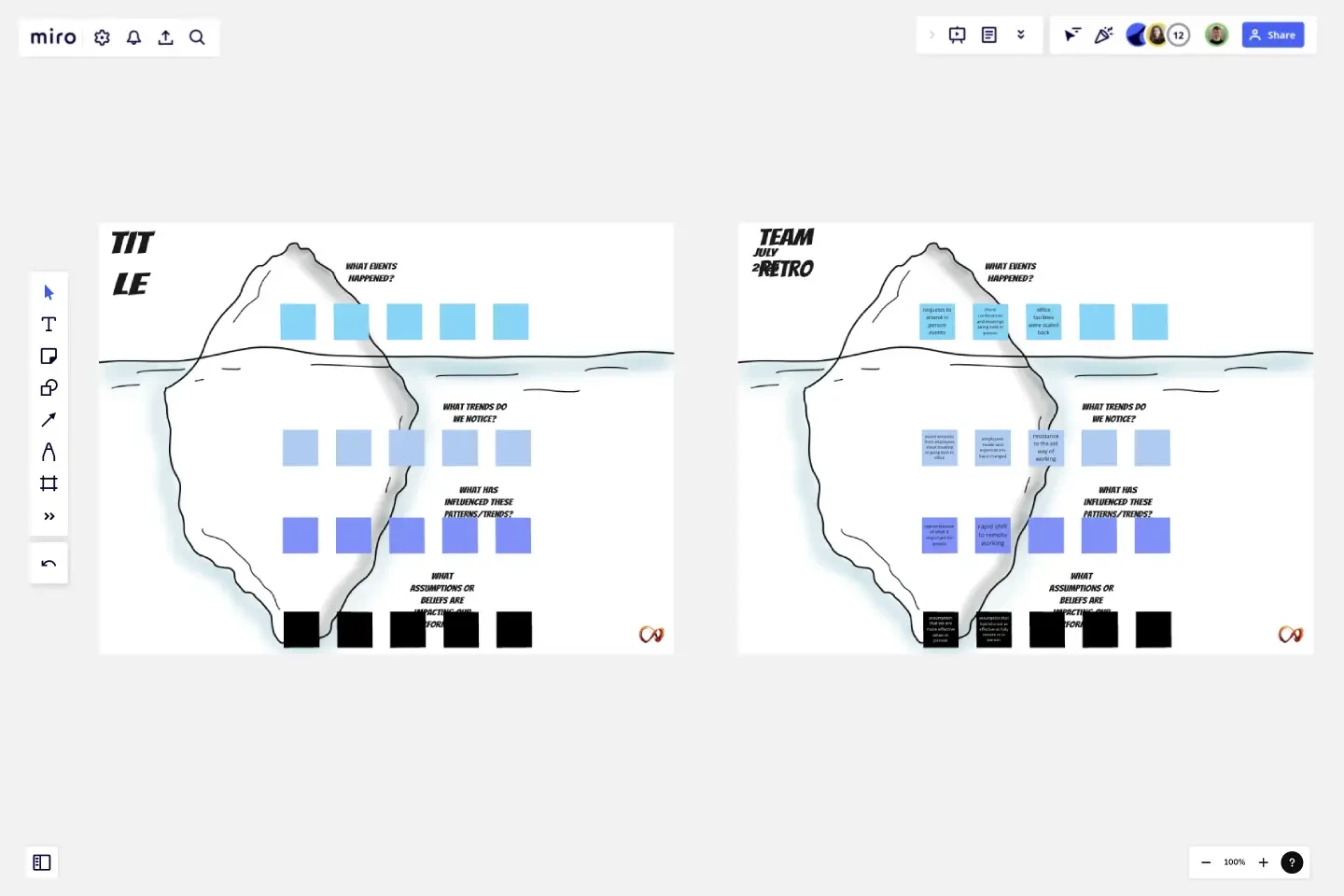Iceberg Reflection
This handdrawn canvas using the metaphor of an iceberg is digging deeper and getting below what is on the surface of what is happening. After all 85% of the icebergs lies below the surface of the water.
This canvas is an engaging and fun way to get a team reflecting on their performance and looking for root causes. It helps ensure that everyone gets heard and alignment is created.
When to Use the Canvas?
As a leader or facilitator there are key moments in a team's journey when a deeper reflection and regrouping are required. Use this canvas at these touch points. This may be scheduled periodically to support moving from forming, storming, norming and performing (Bruce Tuckman's team development model) or when you notice team behaviors require an intervention.
This canvas is particularly helpful when you realize that limiting mindsets and assumptions are getting in the way of the team's progress.
Why Use It?
Because handdrawn elements bring a whimsical and fun energy into work, and who couldn't use more of that on a day to day basis?! Plus no one ever complained of too much alignment or shared understanding in a team.
How to Use It?
The prompt questions in this template support reflection and reconnection. The prompt questions in this canvas are borrowed from Systems Thinking.
(Original source of the iceberg model is believed to be Anthropologist Edward T. Hall)
These prompt questions are suggestions, feel free to change these prompts to support the conversation you want to have with your team.
Start by focusing on the events that happened, then move to the trends, what is influencing these trends and down to the underlying assumptions impacting performance.
This template could also be used during change programs and/or in team or personal coaching conversations. Other versions of the iceberg model have been used to explore organizational culture.
Have fun and let the lighthearted spirit of the canvas ignite inspiration and creativity!
This template was created by Island Inspirations.
Get started with this template right now.
Agile Marketing Kanban
Works best for:
Agile, Kanban
The Agile Marketing KANBAN template adapts Kanban principles to the marketing domain, enabling teams to manage campaigns, tasks, and workflows efficiently. It provides visual boards for planning, prioritizing, and tracking marketing activities, ensuring alignment with strategic goals and timely delivery of campaigns. With customizable columns and swimlanes, this template empowers marketing teams to visualize work, limit work in progress, and optimize their processes, driving agility and effectiveness in marketing operations.
Midnight Sailboat Retrospective
Works best for:
Retrospectives, Meetings, Agile Methodology
The Midnight Sailboat Retrospective template offers a metaphorical journey through past experiences and future aspirations, likening the retrospective process to a midnight sailboat voyage. It provides elements for reflecting on challenges faced, lessons learned, and goals for the future. This template enables teams to navigate uncertainties, chart a course for success, and foster a culture of resilience. By promoting reflection and metaphorical thinking, the Midnight Sailboat Retrospective empowers teams to overcome obstacles, embrace change, and sail towards their goals effectively.
SIPOC Process Map
Works best for:
Agile Metodology
The SIPOC Process Map is a visual tool for documenting the high-level process flow of a system or project. It helps teams identify Suppliers, Inputs, Processes, Outputs, and Customers, facilitating a holistic understanding of the value stream. This template enables teams to visualize key process elements and interdependencies, empowering them to identify areas for improvement and optimize workflow efficiency. By promoting transparency and collaboration, the SIPOC Process Map empowers organizations to deliver value more effectively and satisfy customer needs.
Scrum Compass
Works best for:
Agile, Meetings, Workshops
The Scrum Compass is a visual tool for guiding Scrum teams through their journey. It provides a structured framework for understanding Scrum roles, events, artifacts, and values. This template offers a comprehensive overview of Scrum principles and practices, enabling teams to align on common goals, roles, and processes. By promoting clarity and alignment, the Scrum Compass empowers teams to navigate the complexities of Agile development and deliver value with confidence and efficiency.
Sprint Review Template
Works best for:
Sprint Review, Agile
The Sprint Review Template is a vital tool in Agile project management that enhances communication between team members and stakeholders by providing a clear format for presenting the sprint's accomplishments and challenges. It encourages active participation and feedback from all attendees, leading to more informed decision-making and continuous improvement. In essence, it's a catalyst for meaningful dialogue and collaborative growth.
Lean Coffee: Meetings without Agendas
Works best for:
Agile
Lean Coffee: Meetings without Agendas is a collaborative meeting format that fosters open dialogue and emergent topics. Participants suggest discussion topics, vote on them, and engage in time-boxed conversations. This template provides a structured framework for facilitating Lean Coffee sessions, enabling teams to prioritize topics, share insights, and make decisions collectively. By promoting inclusivity and adaptability, Lean Coffee empowers teams to address issues efficiently and drive continuous improvement.
